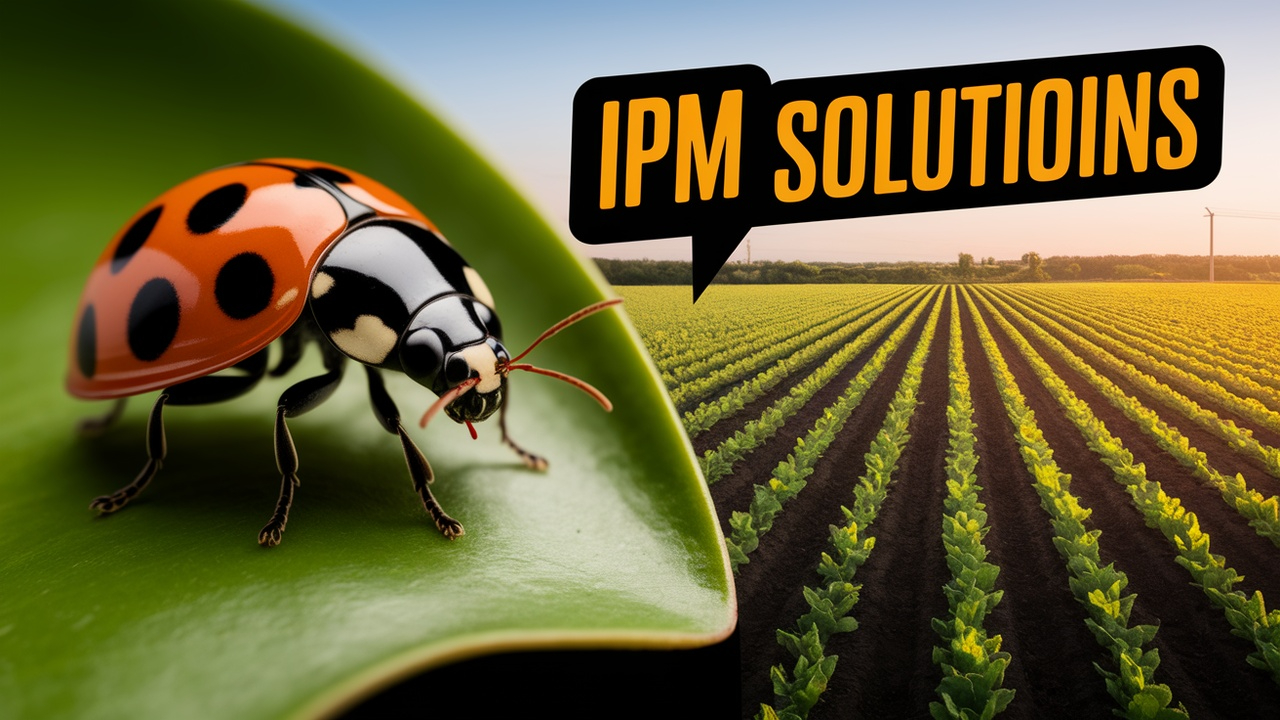
This comprehensive course on Integrated Pest Management (IPM) equips farmers with essential knowledge and skills to manage pests sustainably and effectively. Participants will learn about pest identification, monitoring techniques, and various control strategies to enhance crop health while minimizing environmental impact.
Course Levels
-
Level 1: Introduction to Integrated Pest Management
This level introduces the fundamental concepts of Integrated Pest Management, its importance, and the basic principles that guide pest management practices.
-
Level 2: Understanding Pests and Their Impact
In this level, participants will delve deeper into the types of pests, their life cycles, and the impact they have on agriculture and ecosystems.
-
Level 3: Cultural Control Methods
This level focuses on cultural control methods that can be employed to prevent pest infestations and promote plant health.
-
Level 4: Biological Control Strategies
Participants will learn about biological control methods, including the use of natural predators and parasitoids to manage pest populations.
-
Level 5: Chemical Control Options
This level covers the safe and effective use of chemical pesticides, including types of pesticides and their role in an IPM program.
-
Level 6: Developing an IPM Plan
In this level, participants will learn how to create a comprehensive IPM plan tailored to their specific agricultural practices and environments.
-
Level 7: IPM in Different Agricultural Systems
This level explores the application of IPM principles across various agricultural systems, including organic and conventional farming.
-
Level 8: Future Trends in Pest Management
Participants will examine emerging trends and technologies in pest management, including precision agriculture and biotechnological advances.
Course Topics
-
Integrating Biological Control with Other Methods
# Integrating Biological Control with Other Methods In Integrated Pest Management (IPM), the goal is to control pest populations while minimizing risks to human health, beneficial organisms, and the ...
-
Regulatory Considerations in Pesticide Use
# Regulatory Considerations in Pesticide Use Pesticides play a critical role in Integrated Pest Management (IPM) strategies, but their use is heavily regulated to ensure safety for humans, wildlife, ...
-
Risk Assessment and Safety Precautions
# Risk Assessment and Safety Precautions ## Introduction Risk assessment is a systematic process of evaluating the potential risks that may be involved in a projected activity or undertaking. In the ...
-
Selecting Appropriate Control Strategies
# Selecting Appropriate Control Strategies In Integrated Pest Management (IPM), selecting the appropriate control strategies is crucial for minimizing pest damage while maximizing environmental and e...
-
Genetic Engineering and Pest Resistance
# Genetic Engineering and Pest Resistance Genetic engineering has emerged as a significant tool in modern agriculture, particularly in developing pest-resistant crops. This technology allows scientis...
-
Introduction to Biological Control
# Introduction to Biological Control Biological control is a critical component of Integrated Pest Management (IPM) that leverages natural predators, parasites, and pathogens to manage pest populatio...
-
Setting Goals for IPM Implementation
# Setting Goals for IPM Implementation Integrated Pest Management (IPM) is a holistic approach to pest control that combines various management strategies and practices to minimize the impact of pest...
-
Conducting a Pest Risk Assessment
# Conducting a Pest Risk Assessment ## Introduction Conducting a Pest Risk Assessment (PRA) is a critical component in developing an Integrated Pest Management (IPM) plan. This process helps farmers...
-
Types of Agricultural Pests
# Types of Agricultural Pests Agricultural pests are organisms that cause harm to crops, livestock, or stored products. Understanding the different types of pests is crucial for effective Integrated ...
-
Precision Agriculture in Pest Management
# Precision Agriculture in Pest Management Precision agriculture (PA) is revolutionizing the way farmers manage their crops and pest populations. By leveraging technology, farmers can make informed d...
-
Factors Affecting Pest Populations
# Factors Affecting Pest Populations Understanding the factors that influence pest populations is crucial for effective Integrated Pest Management (IPM). This knowledge helps farmers make informed de...
-
IPM for Specialty Crops
# Integrated Pest Management (IPM) for Specialty Crops ## Introduction to IPM for Specialty Crops Integrated Pest Management (IPM) is a holistic approach to pest control that combines multiple strate...
-
Rearing and Releasing Beneficial Organisms
# Rearing and Releasing Beneficial Organisms Beneficial organisms play a crucial role in integrated pest management (IPM) by helping control pest populations in a natural and sustainable way. This to...
-
Case Studies of Successful IPM Plans
# Case Studies of Successful IPM Plans Integrated Pest Management (IPM) is a holistic approach to managing pests that emphasizes the use of multiple strategies to minimize the impact of pests on crop...
-
Sustainable Practices and Their Future
# Sustainable Practices and Their Future in Integrated Pest Management (IPM) ## Introduction Sustainable practices in agriculture are essential for ensuring food security, protecting the environment,...
-
Sanitation and Hygiene in the Farm
# Sanitation and Hygiene in the Farm Sanitation and hygiene are critical components of Integrated Pest Management (IPM) that help prevent pest infestations and promote a healthy farm environment. Thi...
-
Beneficial Organisms in Agriculture
# Beneficial Organisms in Agriculture ## Introduction In the realm of Integrated Pest Management (IPM), understanding the role of beneficial organisms is crucial for promoting sustainable agricultura...
-
Monitoring and Evaluating IPM Effectiveness
# Monitoring and Evaluating IPM Effectiveness ## Introduction Monitoring and evaluating the effectiveness of Integrated Pest Management (IPM) strategies is crucial for ensuring that pest control meth...
-
Utilizing Resistant Cultivars
# Utilizing Resistant Cultivars Resistant cultivars are plant varieties that have been bred or selected for their ability to withstand specific pests and diseases. This approach is an essential part ...
-
Community-Based IPM Approaches
# Community-Based IPM Approaches Community-Based Integrated Pest Management (IPM) is a participatory approach that emphasizes the role of local communities in managing pests and diseases in agricultu...
- And 20 more topics...